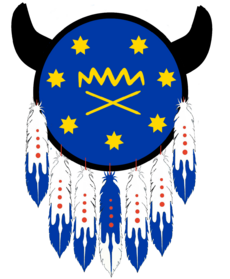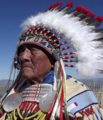Council of Seven Fires
This text is non-canon because it was either retconned, the lore was changed, or the countries listed in this article no longer exist. Please comment on this article's talk page to share your input, comments and questions. Note: Linking this article might complicate your own worldbuilding. |
Council of Seven Fires ᏧᎾᏓᏱᎵᏓᏍᏗ ᏂᏛᎴᏅᏓ ᎦᎵᏉᎩ ᎠᏥᎳ | |
|---|---|
 | |
| Type | |
| Type | Tribal Council |
| Leadership | |
Tecumseh since November 2002 | |
| Seats | 7 chiefs |
| Elections | |
Last election | November 6, 2012 |
Next election | November 6, 2022 |
| Meeting place | |
| Kestejoo | |
The Council of Seven Fires (Meoquanee: ᏧᎾᏓᏱᎵᏓᏍᏗ ᏂᏛᎴᏅᏓ ᎦᎵᏉᎩ ᎠᏥᎳ) is the legislative body of the Meoquanee Nation, and it is responsible for making decisions that affect the entire confederation. The council is named after the seven tribes that make up the Meoquanee Nation, and it meets four times per year at the beginning of each season. The council can also hold special sessions, which can be called by any of the chiefs. The council is overseen by the High Chieftain, who is elected every ten years from among his peers. The High Chieftain serves as the head of the council and is responsible for presiding over its meetings and ensuring that its decisions are carried out. The current High Chieftain is Tecumseh of the Ehawee, who has held the position since 2002.
History
Prior to 1794, the tribes of the Meoquanee had little interaction with eachother outside of trade and every 4 years they would all come together for a celebration and to share stories. However, in 1794 Tuskaluza succeeded in uniting the tribes during the -PLACEHOLDER- war, he established a council that compromised of the chiefs of each of the seven tribes known then as the Great Council of Braves with himself at the head as the High Cheftian. After the war, Tuskaluza saw the benefit of keeping the tribes as one and reformed the council into what is today the Council of Seven Fires. Tuskaluza remained as High Chiefian of the council until his death in 1837. After his passing, the question of who would succeed him was brought before the council which decided to elect the new High Chieftain every years among themselves which remains to this day.
Function
The Council of Seven Fires plays a crucial role in ensuring that the Meoquanee Nation remains unified and cohesive, despite the diversity of its member tribes. The council is a space for the different tribes to come together, discuss their concerns, and work collaboratively towards solutions that benefit the entire confederation. The council operates on the principles of consensus-building and respectful dialogue. All members have an equal voice, and decisions are made through a process of negotiation and compromise. This approach allows the council to take into account the diverse perspectives and needs of the different tribes, while still reaching decisions that serve the greater good of the entire confederation.
The council also serves as a guardian of the cultural heritage of the Meoquanee people. Through its decisions, it helps to preserve the traditional practices, beliefs, and customs that have been passed down through generations. This includes protecting sacred sites, promoting language revitalization efforts, and ensuring that cultural practices are integrated into everyday life. The High Chieftain plays a crucial role in the council's operations. As the head of the council, the High Chieftain is responsible for leading discussions, mediating disputes, and ensuring that decisions are carried out. The position of High Chieftain is highly respected, and those who hold the position are expected to demonstrate exceptional leadership qualities and a deep commitment to the values and traditions of the Meoquanee people.






